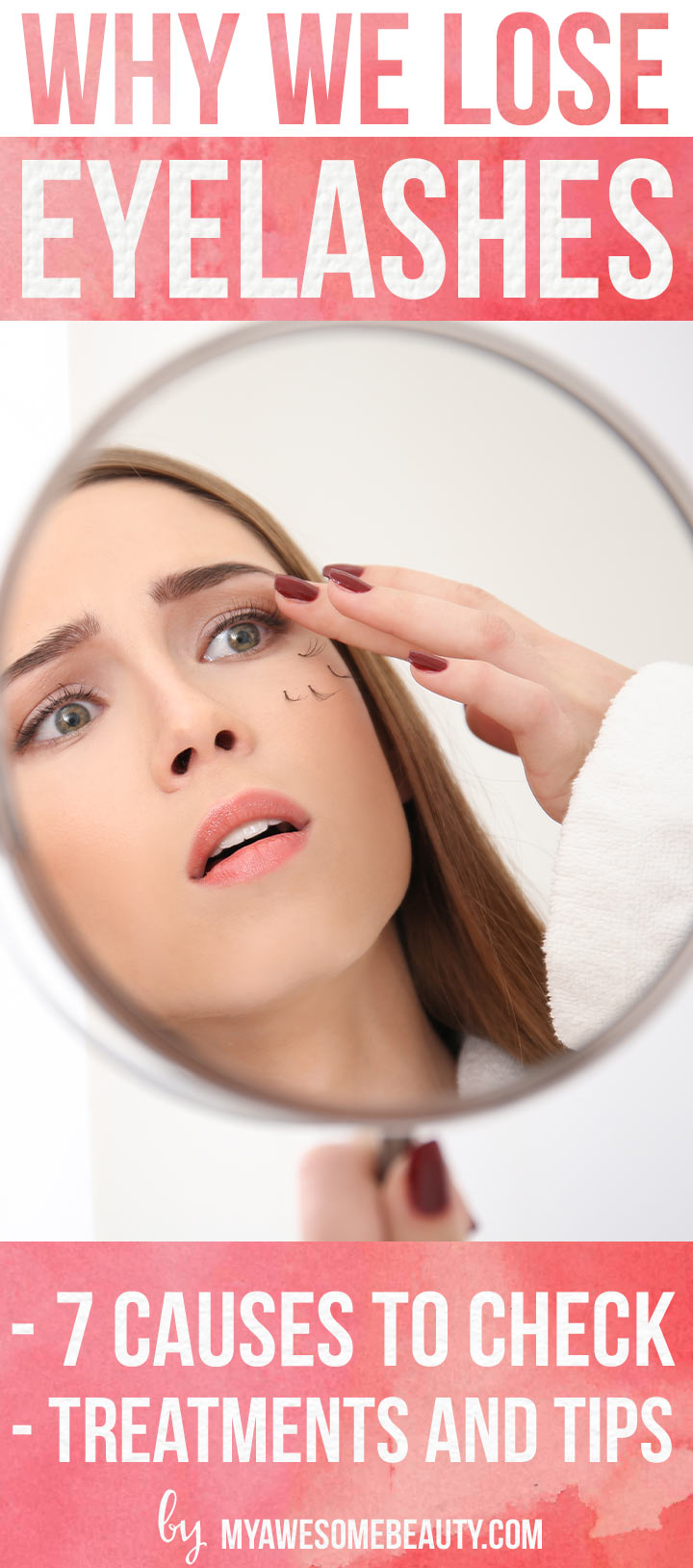
Full, luxurious eyelashes are something on every woman’s wish list.
Lashes like these have always been a sign of beauty, youthfulness, and can make a girl feel confident and sexy.
Unfortunately, it is common for women to experience hair loss at times, including the loss of eyelashes.
In general, the life expectancy of an eyelash ranges between 4-5 months. Once the old lash falls out, a new one will begin to grow.
But, if you have an abnormal number of eyelashes beginning to fall out, it could be the result of an underlying problem. The scientific term for eyelash loss is madarosis.
In fact, this is not a disease in and of itself, but it can be tied to a number of different conditions or causes.
Still, losing lashes can prove to have a big effect on some people’s self-esteem. Furthermore, eyelashes are important for keeping dust, sweat, and allergens out of our eyes, so if you lose a large number of lashes you can have a higher risk of eye irritation.
In fact, many different reasons can explain your eyelash loss, and, in most of these cases, the issue is only temporary. Still, it is important to identify the underlying cause to see what options you might have for preventing further issues.
Below, we’ll discuss some of the 7 most common reasons women lose their lashes.
What aging does to our eyelashes
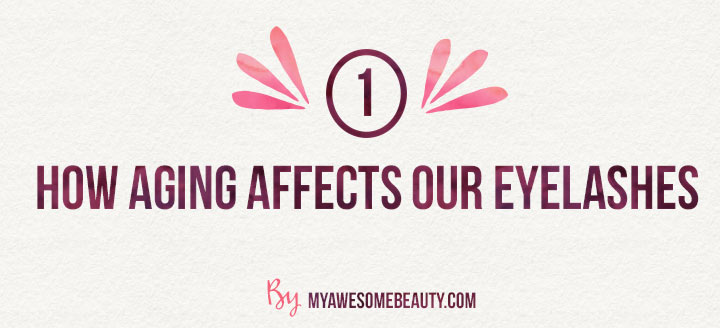
Aging is part of our life. Even with the best products available, it simply cannot be avoided. As time goes by, we will begin to notice a few changes.
Our skin will become looser, we will begin to develop wrinkles ( use vitamin C serums to fight them), and we will start to see age spots appear on our skin. In many cases, we will also begin to notice thinning eyelashes.
This occurs for many reasons.
The most common is that, as we get older, our hair follicles age along with us. Eyelashes have three stages in their growth cycle: the anagen, the phase when your lashes grow, the catagen, or transition stage, and the telogen, with your eyelashes being fully-grown and functional. After this last stage is over, the lashes simply fall out.
Now, all of your individual lashes will continually go through these three stages as you go about your life. Eventually, however, the production of new eyelash follicles might begin to slow down, or even stop altogether. As your current lashes fall out with nothing to replace them, you end up with a noticeable thinning effect.
Another way aging contributes to eyelash loss is that our skin can often become much dryer, which can lead to our eyelashes losing the ability to maintain moisture. In fact, the drier your eyelashes get, the more susceptible they are to damage from environmental factors and even the physical act of rubbing or scratching.
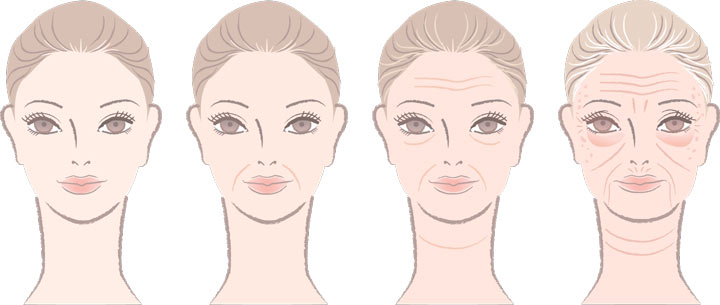
The hormone changes we experience as we age can also lead to eyelash loss. During the phase of menopause, for example, our body experiences a decreased production of progesterone and estrogen.
Estrogen, for one, plays a significant part in collagen production and in helping us maintain thick, full hair. As the levels of estrogen start to decline – often when we’re in our fifties – our lashes tend to get shorter and less thick.
When this starts to happen, you might find that your eyes will start to look more tired, older, and maybe even a little smaller. This is a result of the same decline in hormones. That said, if you are younger and you experience signs that your estrogen is low, we recommend you see a doctor to ensure that you don’t need to be put on hormone treatment.
As many women know, our hormones also change dramatically during pregnancy and even after the birth of a child. The good news is that this eyelash loss during these times is only temporary, and once your level of hormones is back to the normal range, your eyelashes will come back as well.
Of course, technology has not yet come up with a way to interrupt the aging process, though many of us have our fingers crossed. Still, there are several steps you can take if you feel you are experiencing menopause-related eyelash loss. For instance:
- Consult your doctor and discuss the possibility of hormone replacement therapy.
- Get to exercise more often and try to eliminate stress
- Eat healthier, particularly food rich in Omega 3 Fatty Acids. These acids help balance your hormones and can be found in some omega 3 supplements such as this bestseller here on amazon, oily fish like salmon and mackerel, flax seeds and chia seeds, walnuts, and olive oil.
- Use extra virgin coconut oil ( we like this one for hair, skin and cooking on amazon), which can also help balance hormones. You can use the oil in cooking or take two to three tablespoons every day for 1-2 months.
- Another great supplement for maintaining a good ratio between progesterone and estrogen is the Chasteberry herb. We like this supplement here on amazon.
Remember, every step you take toward living a healthier life gets you closer to stronger and healthier lashes !
Why Rubbing or Pulling can damage your lashes
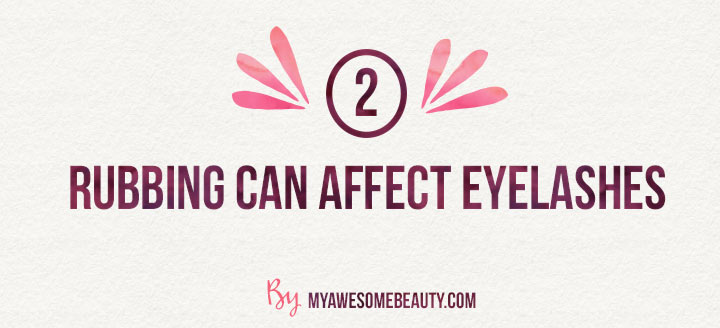
It’s important to remember that your eyelashes are very delicate, especially the root, so you need to be extra careful with them.
When we constantly rub our eyes, we can dramatically speed up lash loss and also contribute to the formation of wrinkles.
As we discussed, lashes eventually fall out when their life cycle ends. When we stop this cycle by rubbing the lashes to fall out earlier, it can take them longer to grow back.
Now, it’s common for eye irritations from allergies, dust, and other particles to cause your eyes to itch. Likewise, certain infections of the eye can cause them to be incredibly itchy and dry.
So next time you want to rub your eyes, remember to be gentle and to only do so when your hands are clean. You should also be gentle when rubbing your eyes to remove makeup. Use a cotton pad with a gentle makeup remover to keep from damaging your lashes.
Do you have any Mascara Allergies?

Some mascara brands contain chemicals that can make your lashes less resistant and more prone to breakage and ultimately lead to eyelash loss.
Many waterproof mascaras also carry chemicals that can lead to allergic reactions and break your eyelashes.
If you suffer from allergies, it’s best to avoid products that contain things like aluminum powder, parabens, fragrances, and triethanolamine.
If you don’t want to bother identifying the ingredients in your mascara, try looking for brands that are specifically formulated for sensitive eyes or that are 100% natural. ( We love this mascara brand here on amazon) These brands are much more likely to make you feel sexy without damaging your lashes.
In some cases, mascaras can lead to inflammations such as dermatitis and conjunctivitis.
- Dermatitis is an inflammatory reaction of the eyelid skin, often resulting from the contact with a trigger substance like those contained in some mascara brands.
- Conjunctivitis, aka a “pink eye,” is often the result of some allergens or bacteria falling into your eyes, which will irritate the conjunctiva (the thin membrane covering your eyeballs).
If you have an infection of the eye or eyelids, needless to say that you should consult your doctor as soon as possible. You’ll avoid touching your eyes, as this can cause the infection to spread. Most importantly, if you have an infection, don’t use any eye make-up as long as the infection is not treated.
To be on the safe side, make sure to stay away from mascaras of inferior quality or those that are past the expiration date. Sure, there might be a little bit left in your last year mascara, but it’s best to get a brand-new tube every 4 to 6 months. You also want to make sure you clean your makeup off every night, so you let your skin and eyelashes “breathe” ….
How stress will affect your eyelashes
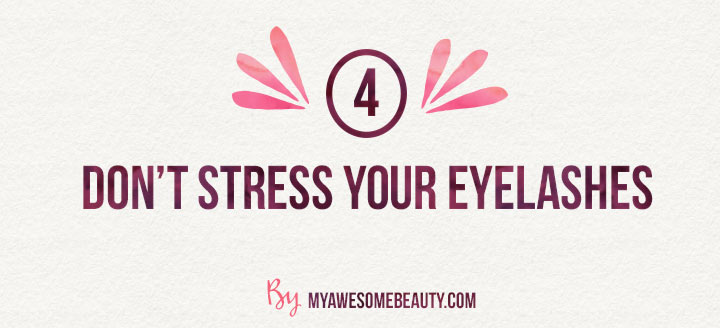
Stress plays a huge part in determining our mental and general health. There are many diseases that result from stress, which can lead to various hormonal changes.
Under stress, we can end up skipping meals, having issues falling asleep, and experiencing changes in our metabolism that affect our cortisol body level.
These variations can dramatically affect the hair in our lashes and brows. Furthermore, when we are under pressure, our body has trouble properly absorbing vitamins, which can affect our lash health as a result.
Have you ever bitten your nails or twirled your hair when stressed out? If you have, it’s OK, because behaviors like these are quite common.
However, there is a rather common form of anxiety disorder called Trichotillomania, when people react to stress by pulling out their own hair. In fact, many celebrities like Megan Fox, Charlize Theron have reported suffering from the condition.
At its heart, trichotillomania is an impulse control disorder related to stress and anxiety. People suffering from the condition often twist, rub, or pull out hair from, eyebrows, scalp and eyelashes. This condition usually develops during childhood or early teenage years and frequently continues into adulthood. There are a number of treatments for the condition, and the most common one is called “Habit Reversal Training”.
Various Health Conditions you probably have never heard of
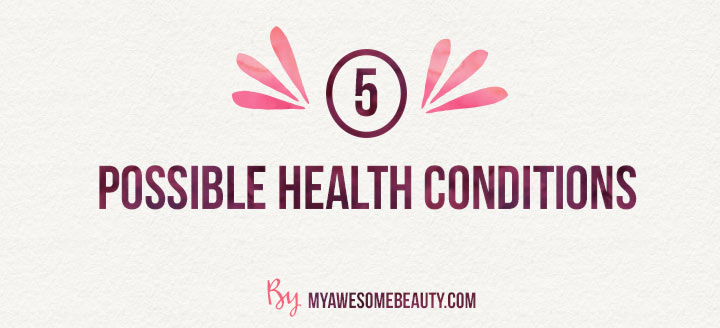
Stress can lead to more than just disorders – it can lead to actual health conditions as well. Examples include :
- Telogen Effluvium
- Alopecia Areata.
Back when we discussed the growth of hair, we mentioned there are three district cycles that end when the hair falls out. The last cycle is known as the telogen stage, and it is completely natural.
However, Telogen Effluvium is a condition where too much hair falls out. This usually takes place 2 to 4 months after a significant stress incident, such as a long disease, surgery, or a serious infection. It is also common after childbirth, when a woman’s hormone levels can change a lot. In most cases, this condition only affects the scalp. But, in some more severe cases, it can also affect the eyelashes and eyebrows. Luckily, this condition is totally reversible and does not do any permanent damage to follicles.
Alopecia Areata is what we call an immune system disorder in which a person’s own immune system cells will attack their hair follicles. It is first noticeable on the scalp but will eventually start to affect both eyelashes and eyebrows. While there is no dedicated treatment for this condition, you can treat the symptoms. In most cases, we can get the lost hair to grow back but it might be only temporary.
Besides stress, we also can have issues from a gland called the thyroid.
- Hyperthyroidism
Another common factor in eyelash loss derives from issues with the thyroid gland. When we experience thyroid disorders, it can lead to slower hair growth and the loss of lashes. In fact, eyelash loss is considered an early sign of hyperthyroidism. Of course, even an underactive thyroid can throw off your body’s hormone balance and lead to a number of problems. Once the thyroid problem is resolved, your lashes should return to normal.
We can also have eyelash losses from Eye infections, such as
- Blepharitis
- Demodex.
Blepharitis is an inflammatory reaction of the eyelids and the follicles at the base of the eyelashes. It happens when the ocular glands are irritated and causes redness, itching, and burning. In extreme cases, it can lead to the lashes falling out, particularly in instances where the skin around the eyelash becomes very dry. Luckily, this type of infection usually affects only the eyelashes, and will not affect the hair on the patient’s scalp. Moreover, most of the time, people will experience Blepharitis in both eyes at once, so, also the cases when the infection appears only in one eye are rare. The infection may stem from allergic reactions or some bacterial infections.
While it can be very tempting to rub your eyes for temporary relief, please try to avoid that as this could cause scarring of the follicles, which will actually affect your eyelash growth.
Lastly, while the infection cannot be fully cured, it can still be treated by exercising proper eyelid hygiene.
Just make sure to wash your eyes and apply a warm cotton pad for 4 to 10 minutes a day. You can also mix eyelid-cleaning solution with warm water and gently wipe your eyelids with a small cotton pad once a day. Consult your doctor if there is no improvement and be sure not to wear any makeup while experiencing Blepharitis symptoms.
Another infection that can lead to eyelash loss is called Demodex Folliculorium.
Demodex are a type of parasitic mite that live in your hair. While this is arguably very gross, it’s worth noting that these mites can be found on everyone’s eyelashes and that they usually do no harm at all. However, a large number of mites piling into a single follicle can cause irritation and inflammation. Excessively rubbing your eyes to relieve this irritation may lead to eyelash loss. Most Demodex infestations can be treated at home, but you can consult your doctor if you are particularly concerned. Tea tree essential oil is one of the most effective ways to treat Demodex infestations.
Simply rub equal parts of tea tree oil and vegetable oil such as macadamia nut oil on your eyelashes every day (at night preferably) for 1-2 months, taking care to make sure the oil doesn’t get into your eyes.
You can also use a tea tree oil shampoo ( such as this one we like on amazon), to wash your hair and your eyelashes to help speed up the process.
Of course, remember to avoid wearing any makeup during a mite infestation or any eye infection.
Medications and their side effects on eyelashes
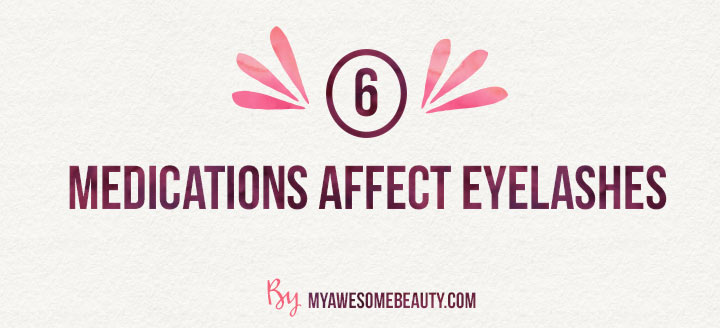
Some prescription medications can also lead to hair loss, including loss of eyelashes and brows.
Studies show that oral anti-acne drugs (for example: Isotretinoin), blood pressure medications, some anti-cholesterol drugs and thyroid balancing drugs, and medicines that treat depression and heart problems have all been directly or indirectly connected to madarosis (eyelash loss).
Some steroids also can lead to eyelash loss. We can also experience hair loss when taking birth control pills.
But the good news is that, in many of these cases, eyelashes gradually grow back as soon as you stop the medications.
Some treatments you get at hospital can also cause eyelash loss.
Notable examples include chemotherapy.
Many patients will suffer a total loss of body hair, as well as eyelashes and eyebrows. In this instance, the only thing a person can do is to let her body to heal completely from the treatment. Once this happens, the hair progressively grows back.
If you think that a certain medicine may be affecting your eyelashes and if you find “hair loss” among the common side effects listed for that medicine, consult your doctor to see if there is a possible replacement medicine.
Why your Diet is important

It is very important to eat a healthy and well-balanced diet if you want to keep your lashes (and all of your hair, for that matter) as healthy as possible. ( our article about the best foods for eyelashes is here)
If you end up going on an extreme diet, for example, and skip meals that are rich in Vitamins B6, C, and E, your lashes may become dry and fall out.
People that suffer from anorexia also experience hair loss at a higher rate because these individuals do not get enough nutrients to feed their bodies, let alone their eyelashes. In fact, if a person stops eating any protein-based food altogether, they will often notice significant eyelash loss within two or three months.
If this person resumes eating enough proteins, like fish, eggs, meats, and beans, then the eyelashes will be able to start growing again.
What to do to keep your lashes

Remember, the most important thing to do when you want to treat eyelash loss is to first find the cause of the problem.
If you clearly don’t have any idea as to what could be the cause, then your first stop should be to a dermatologist who can perform several tests to better understand your problem and come up with the right treatment.
In the case of Trichotillomania, some therapy or counseling sessions are recommended in order to find the deep cause of the behavior. In most cases, it is related to self-control.
If your hair loss is caused by some medication you’re taking, you can consult your doctor to find another similar medicine that does not have this side effect. Though this may not be always possible, you can at least wait until you are off the medication, and your eyelashes will most likely grow back just as they were. An exception, of course, is in the case of chemotherapy. In this case, you will just have to be patient and wait 3-6months once the therapy is over.
If you have an allergic reaction, be sure to avoid wearing any eye makeup, mascara for some time.
If menopause is behind your eyelash loss, you can always consider hormone therapy.
While nothing can really stop the aging process, at least we follow a few tips to slow down the aging process and keep our lashes healthy longer. For instance:
- Maintain good hygiene around your lashes. Remember to remove dirt and makeup from your face before sleeping.
- Chose a gentle makeup remover ( we love this one on amazon) to avoid eye irritation. To remove your eye makeup, use a cotton pad soaked with makeup remover then gently press it on your eyelids for 10 seconds. This will help dissolve your eye makeup and make it easier to remove.
- Avoid rubbing your eyes, especially if you have an allergy. This could on the one hand damage your lashes, and on the other hand, it could also push makeup and dirt into your eye area.
- If you need to use an eyelash curler, make sure not to tug on your lashes. Invest in a high-quality curler (this one is perfect on amazon) in order to avoid doing damage to your follicles.
- Maintain a healthy diet to maximize your eyelash health. Add foods that are rich in protein and vitamins, like beans, broccoli, peppers, and eggs. The nutrients in these foods are like fertilizer for your lashes and will help them grow much faster.
- Remember that various types of oils, including Olive oil, Coconut oil and castor oil such as this one which can stimulate growth and help your eyelashes recover from damage. (apply some oil every day on your eyelashes for at least 1-2 months and you will see a difference). You can also check our guide about the 10 best oils for eyelashes here.
The other solutions to explore
There are many eyelash enhancing serums that can help boost the growth of eyelashes.
They usually contain hyaluronic acid, Provitamin B5 and panthenol, which condition the eyelashes and helps them retain moisture. One of these serums that has been proven to provide great results is this one here, which we highly recommend on amazon.
Also, did you know that there are actually eyelash transplants?
While only for very severe cases, the procedure restores lashes by transferring scalp follicles to your eyelids. If you’re looking for something a little less drastic, you can always invest in false eyelashes. These products are made of synthetic or natural strips of hair which are glued to your eyelid to give the appearance of fuller, thicker eyelashes. Of course, you’ll want to know which type of eyelashes look best on you before you have them applied.
As you can see, there are many reasons why someone may lose his or her eyelashes. We hope our complete guide will help you.
Whatever the cause, however, there is almost always a solution that can stop the process and help you regain the beautiful, luscious lashes you desire.
Feel free to check our other articles:
Leave a Reply